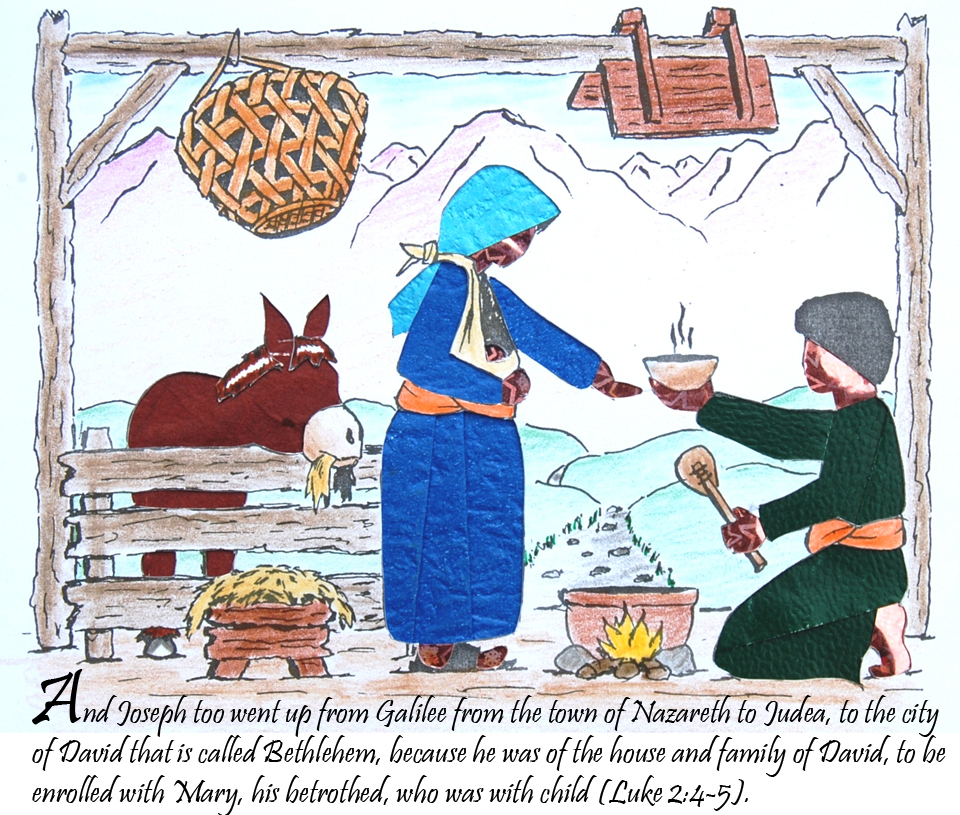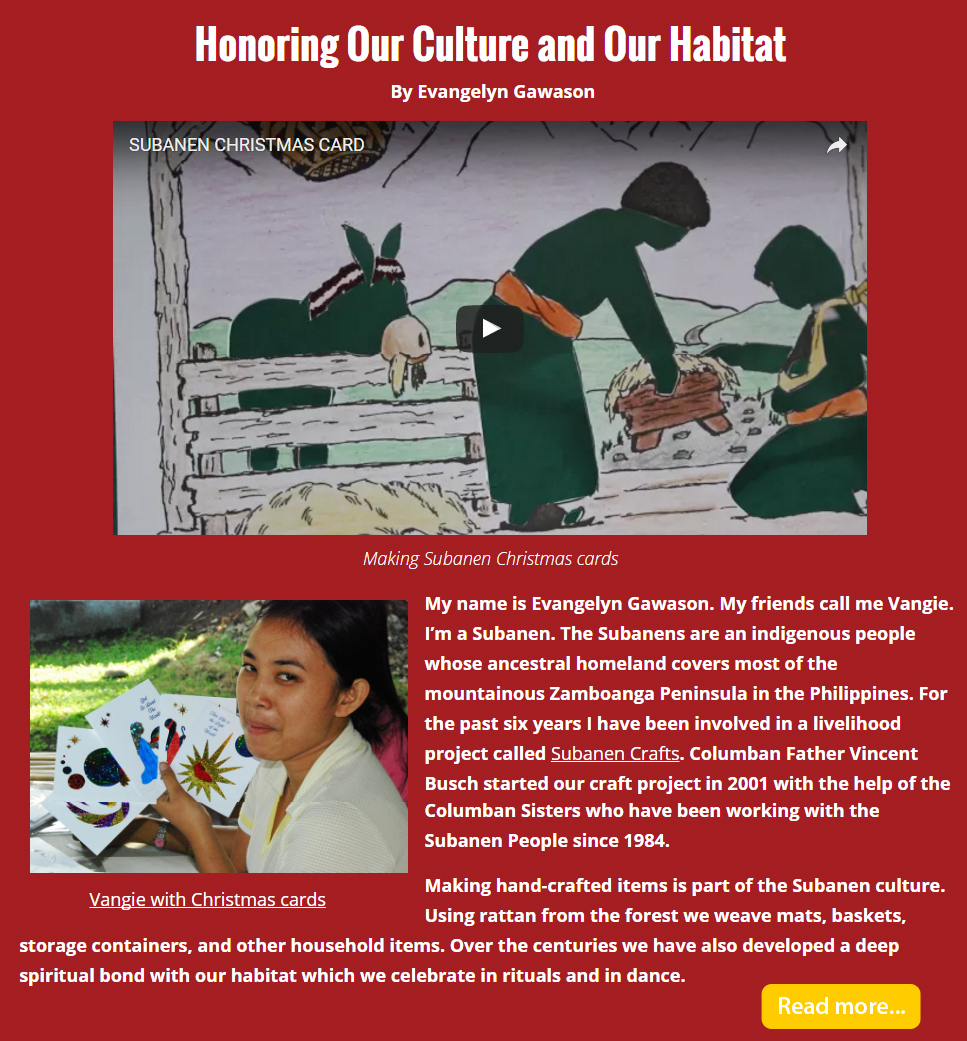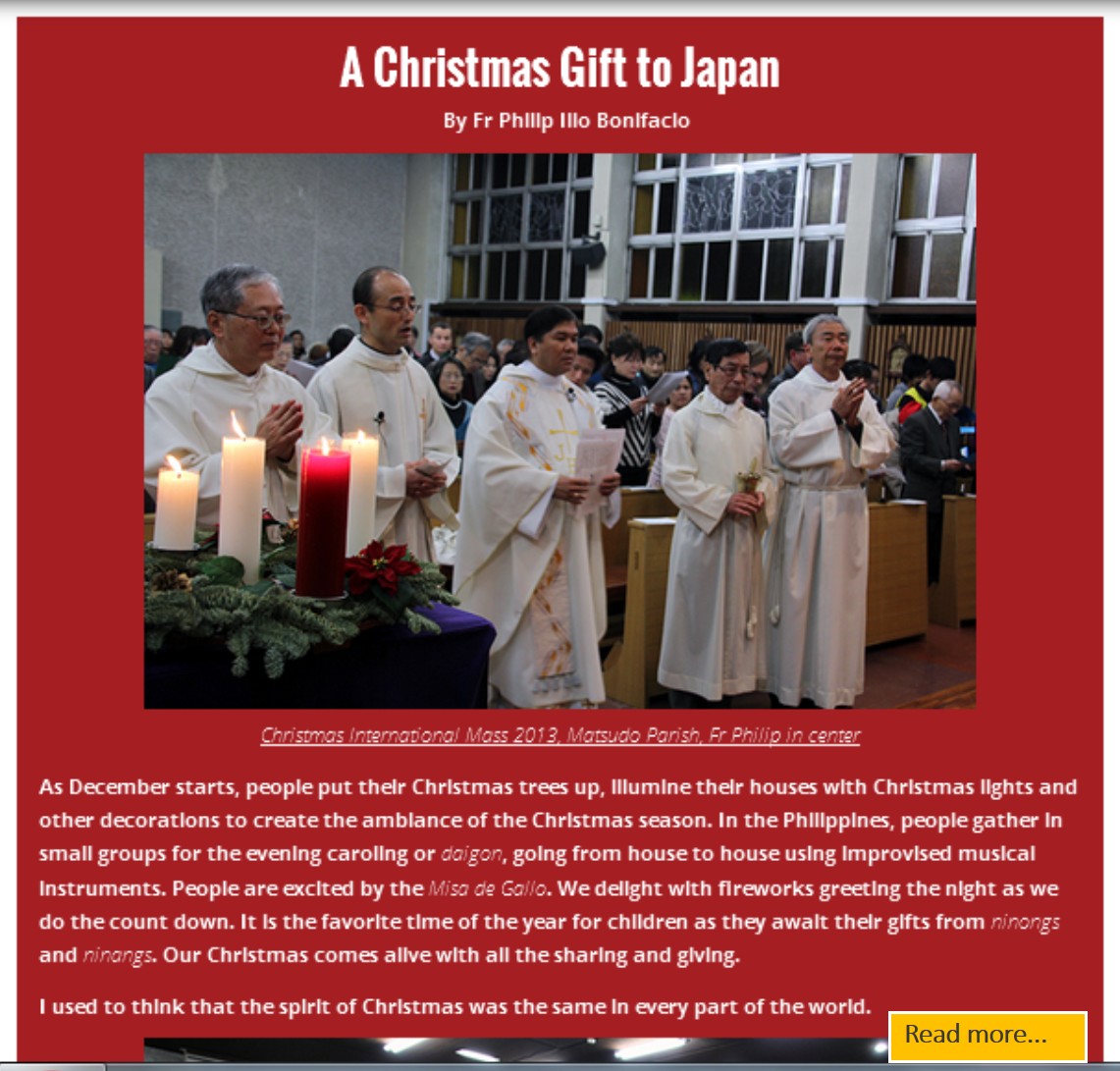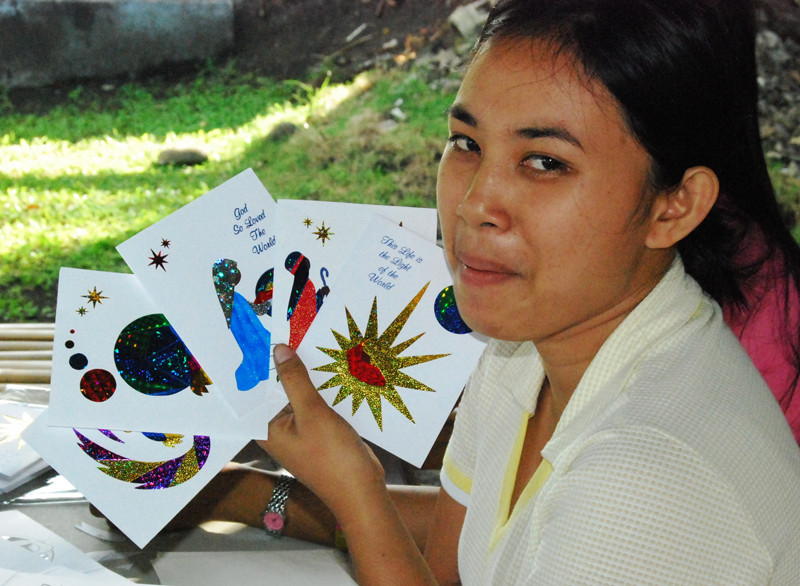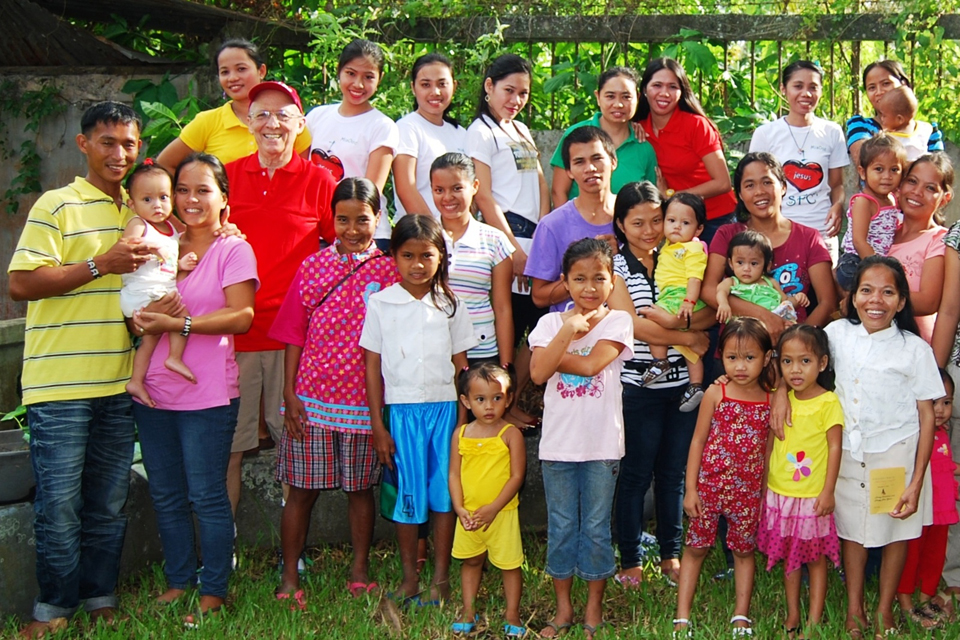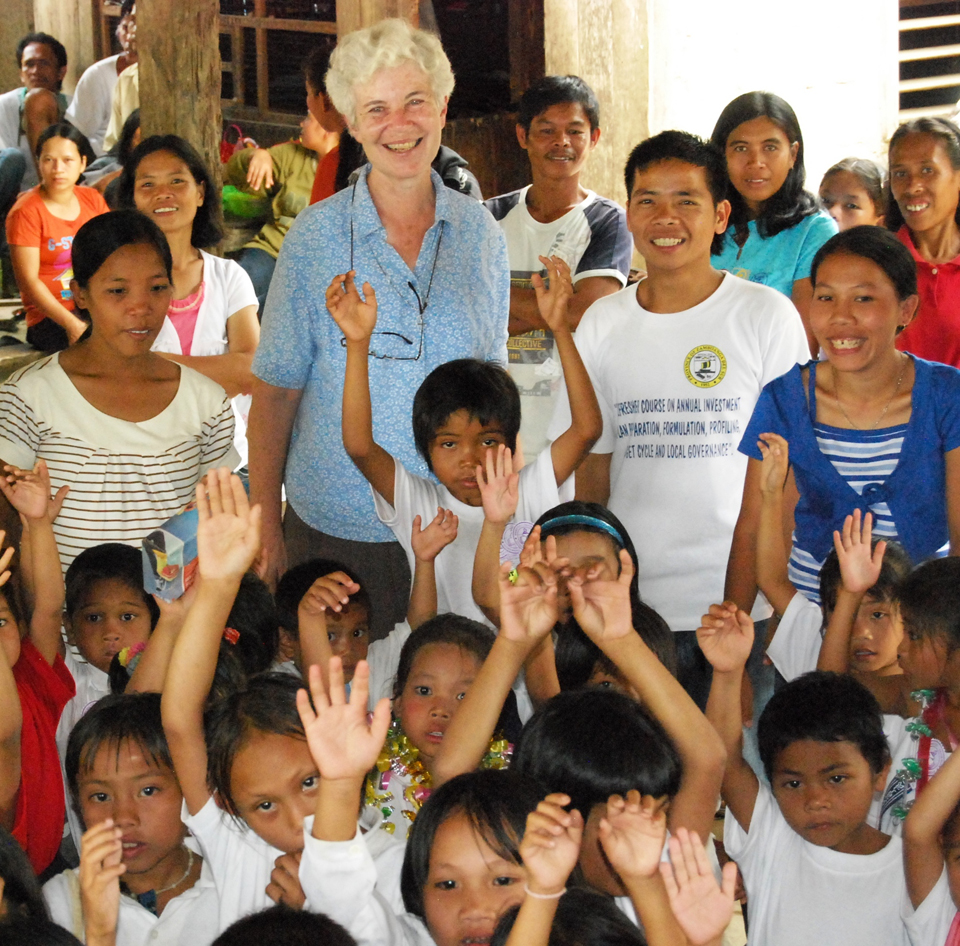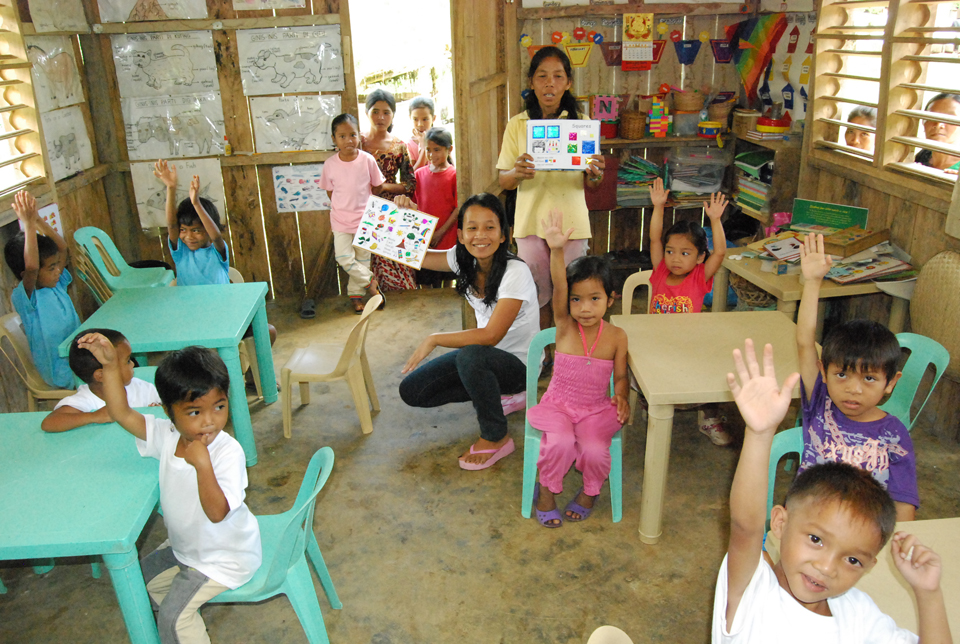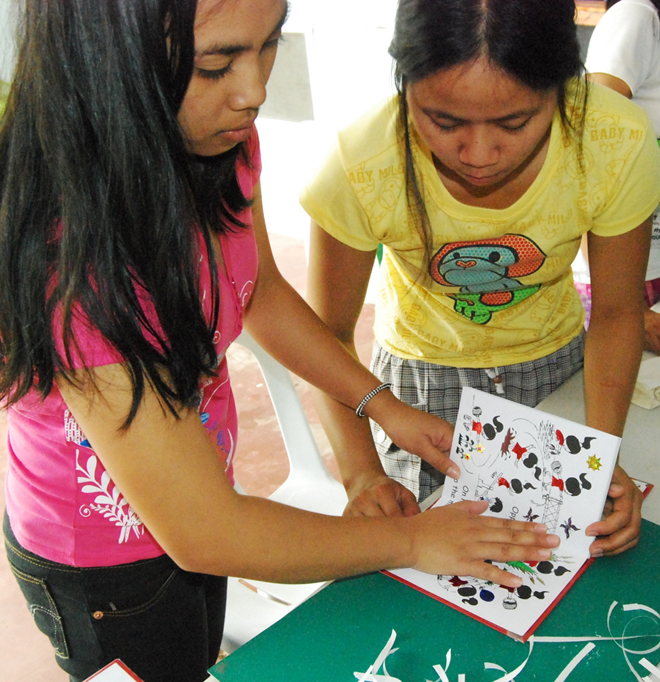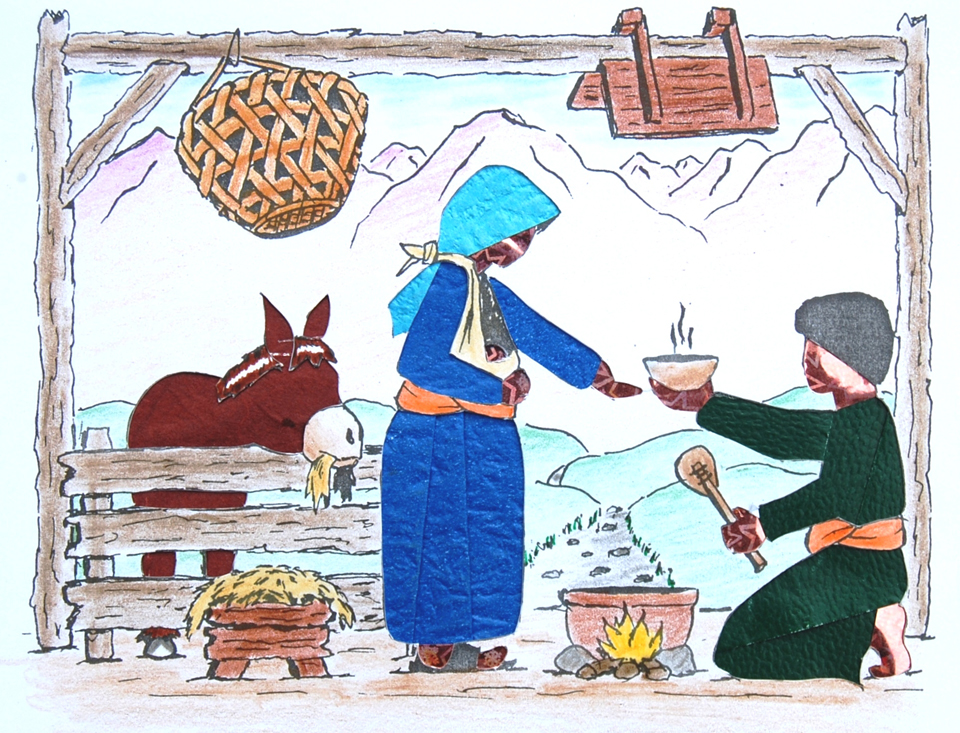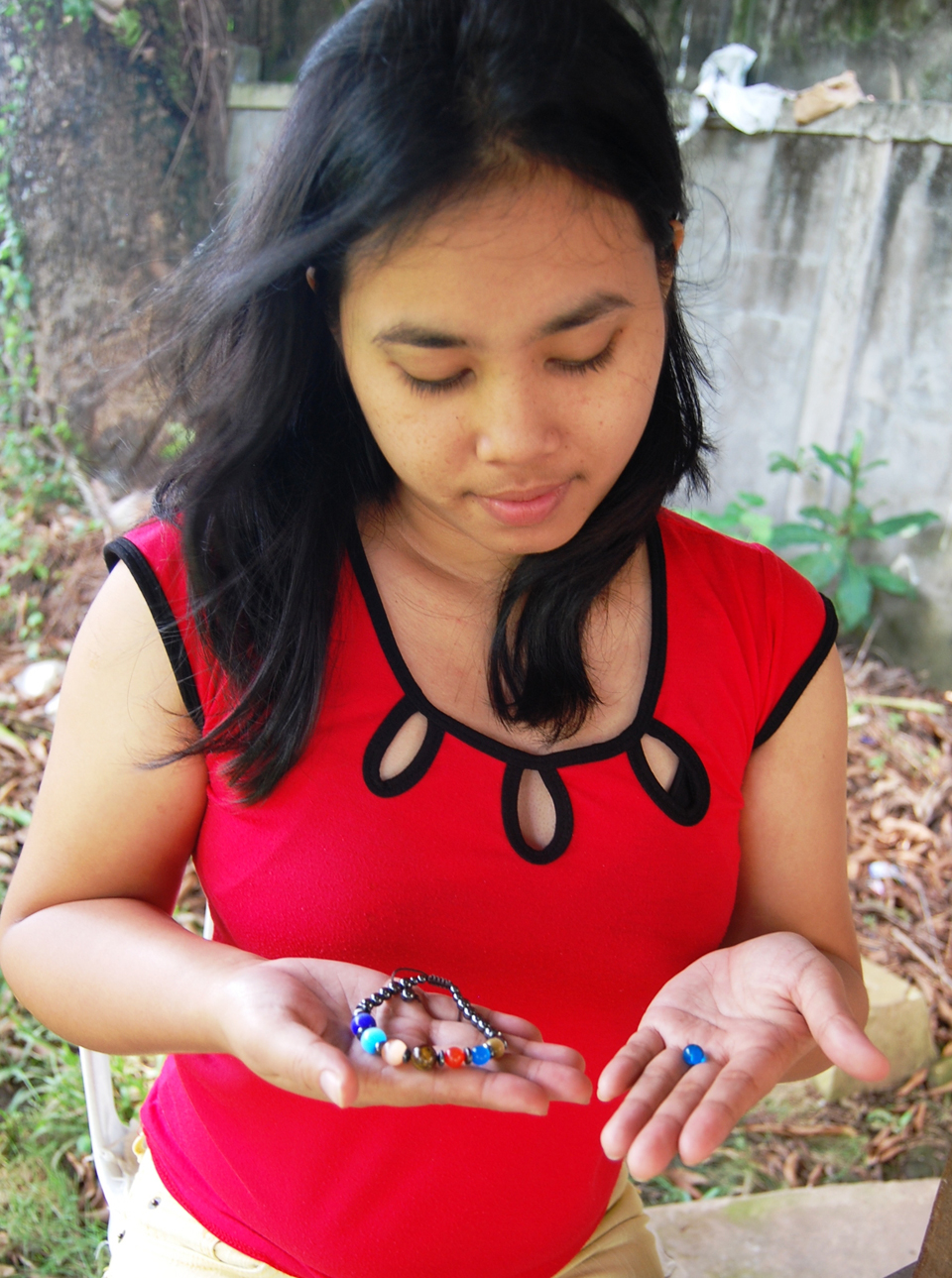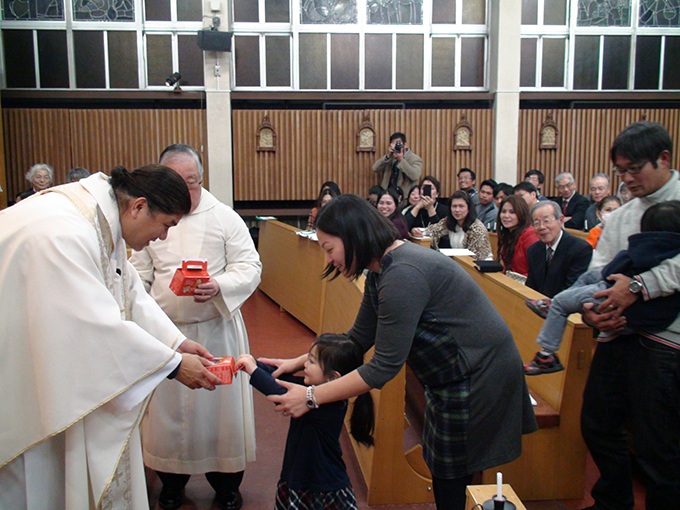Christmas 2016
An old story that’s always new
An old story that’s always new
A reflection for International Migrants’ Day, 18 December
By Fr Bobby Gilmore

Rest on the Flight into Egypt, Gerard David [Web Gallery of Art]
Joseph rose and took the child and his mother by night and departed for Egypt. He stayed there until the death of Herod. (Mt 2-14-15).
The image of Joseph, Mary and Jesus sitting in the shade of a tree with their donkey tethered to a branch outside some Egyptian town all those years ago is repeated almost daily in newscasts. The plight of Syrian, Iraqi, Libyan and African families fleeing for their lives across water, desert and mountain with a few belongings is reminding us that little has changed for millions of men, women and children. Daily we see the terror in their faces as they scramble aboard rickety boats, reach a Mediterranean beach and then a border crossing secured by military armed with assault rifles.
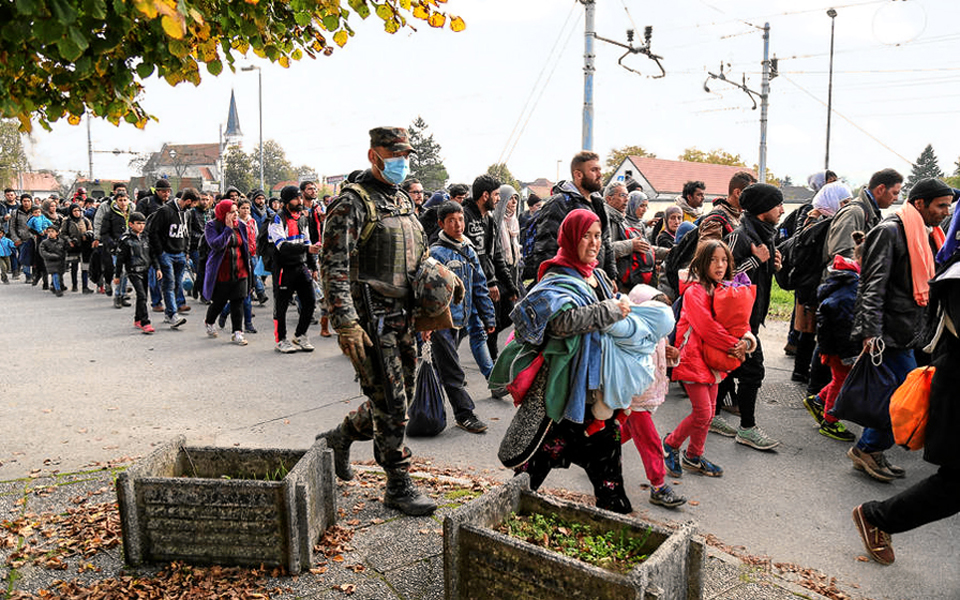
Syrian refugees passing through Slovenia, 23 October 2015 [Wikipedia]
Worse still is the anxious face of a woman guarding her children as their father is handcuffed by border police in Hungary. The anxiety on her face resembles that of Mary under the tree in Egypt, the Jewish children arriving at Liverpool St. Station waiting to be given a home by an English family, the men, women and children on the St Louis in Havana in 1939, the woman and children on Route 66, the Vietnamese woman and children tossed around in a boat in the Pacific, the woman and children at the US-Mexican border fence, the women and children in a refugee camp in Turkey, Lebanon or Jordan, the woman under a tree in the Sahara, the pregnant woman in the camp at Calais, the father of the dead child on a Greek beach, a woman and children waiting to board a bus in a European railway station, the face of the woman and children at the Migrant Rights Centre in Ireland.
From Aid to the Church in Need
It is hard to accept 2,000 years after the flight of Joseph, Mary and Jesus into Egypt that people are running for their lives from the same part of the world today. But more disturbing is the impotence of present world governance to prevent this from happening. Never are there more resources at the disposal of governments to accommodate desperate people who have to flee. Yet, with some exceptions, the application of these resources is found wanting in responding to basic human shelter and safety.
When it comes to making resources available in preparation for war there seems no shortage or lack of military management. And it is precisely the misuse of these military and associated corporate resources initiating and maintaining war and conflict that are causing the human deprivation we see on the faces of people today. How come that the management expertise evident in military expeditions cannot be used to manage human desperation, the residue of war?
The present exodus from the Middle East and Africa didn’t happen overnight. It was predicted years ago by Susan George in her book, The Debt Boomerang. While great progress has been made over the latter half of the last century and in the early years of this century the care of the weak and the dispossessed has become an irritant. Frequently, tabloid media headlines highlight the weak, immigrants, refugees as swarms of scroungers.
Children document life in largest Syrian refugee camp
They are animalized, corralled in 'jungles' of despair, treated with indifference at the drawbridges of European fortresses. Europe has developed a sanitized memory of its post- and pre-war exodus of people looking for safe havens around the world. Echoes of the pre-Second World War Evian conference are heard around Europe today as nations threaten to close their borders to those seeking refuge.
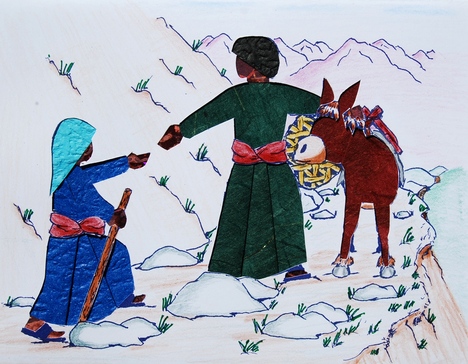
St Joseph helping Mary on the journey to Bethlehem [ Subanen Crafts]
Immigrants and refugees, just like Joseph, Mary and Jesus, do not want to leave home and familiar surroundings. Television images of destruction in their homelands tell the reason for people’s decisions. World powers vie with each other putting their interests before the needs of populations. German Chancellor Angela Merkel is one exception. She responded recently to criticism for allowing refugees into Germany, ‘If we now have to start apologizing for showing a friendly face in response to emergency situations - then that’s not my country’.
As long as that continues to happen the flight into Egypt is never old, always new. How do we respond as we commemorate that event?
The mystery of salvation has known unpredictable and mysterious integrations of peoples, cultures and races. (Carlo Maria Cardinal Martini SJ, Archbishop of Milan, 1991).
Joseph rose, took the child and his mother, and went to the land of Israel. (Matthew 2:21).
Pope Francis invites 21 Syrian refugees to lunch, August 2016
Columban Fr Bobby Gilmore, ordained in Ireland in 1963, has worked for many years in the Migrant and Refugee Apostolate in Ireland. He spent the early years of his priesthood in Mindanao and Camiguin. From 1978 to 1992 he was Director of the Irish Emigrant Chaplaincy in Britain. And from 1992 until 1999 worked in the Diocese of Montego Bay, Jamaica. After returning to Ireland he established the Migrant Rights Centre Ireland (MRCI).
We Were Refugees
|
Honoring Our Culture and Our Habitat
Honoring Our Culture and Our Habitat
By Evangelyn Gawason
Making Subanen Christmas cards
Making hand-crafted items is part of the Subanen culture. Using rattan from the forest we weave mats, baskets, storage containers, and other household items. Over the centuries we have also developed a deep spiritual bond with our habitat which we celebrate in rituals and in dance.
Christmas party with crafters, their families and Fr Vincent Busch
Through the Subanen Craft Project I have learned to use our traditional hand-crafting skills to create beautiful works of art that also celebrate our bond with the natural world. Over 15 years our Crafts Project has provided dignified livelihoods for 76 full time and part time crafters. I want to share how this project and other Columban ministries have helped my family, my people, and our habitat.
Being the oldest in our family I try to help my younger brothers and sisters. My brother Roniel and my sisters Lalay and Jen had to board in the distant town of Midsalip, Zamboanga del Sur, to go to high school. I am thankful that I am able to use my earnings as a crafter to pay for their living expenses, and for their school supplies and project fees.
A basic education is becoming essential for Subanens as more and more land-hungry settlers and resource-seeking industries occupy our ancestral land. Many illiterate Subanens have been fooled into signing or endorsing official documents that authorize outsiders to take possession of our land and its resources.
But going to school is difficult for Subanens. Government schools are free but our families still find it difficult to pay for uniforms, project fees, and school supplies. Our little ones often have to trudge long distances over rough terrain to distant schools where their teachers sometimes arrive late or do not show up at all. They struggle to understand teachers who do not speak our tribal language and who do not understand our customs. Our children begin to feel that our language and culture are not important and they become ashamed. Many stop going to school entirely.
Sr Kathleen Melia SSC with pres-school teachers and students
The Columban Sisters recognized the need to help our little ones overcome their shame. To address this need the Sisters started a pre-school program with Subanen-speaking teachers. Over the years the Sisters and the staff of their Subanen Ministry have built nine pre-schools with an enrollment of more than two hundred. These pre-schools are happy places for our little ones. Their teachers listen with wonder and appreciation when the children tell stories about snakes that fly, about eagles that eat monkeys, about the shy tarsiers that appear only at night, and about the wild pigs that try to eat our crops. Their teachers show gratitude for the sheltering mountains, the forested hills, and the cool streams of our ancestral habitat. They understand how rituals of thanksgiving to God are part of Subanen life. They encourage learning through play, song, dance, and drama. They affirm our culture, honor our traditions, and respect our spirituality.
Pre-schoolers and teachers with our books
Our hand-crafted books use stories and images that are familiar to us. So too do our Christmas cards. Our card designs show Mary and Joseph working together to make their stable a more livable place for each other and for Jesus. Mary and Joseph are like us. Subanen families work hard to make our homes more livable. For example, I was able to pay for the construction of a new kitchen area for our home. Two years ago Fr Busch had his photo taken in our outdoor kitchen area. Recently, he was photographed again in that same cooking area but now it is enclosed within our home. One of our cards shows Joseph cooking for Mary. My family can now cook meals for each other in our new indoor kitchen.
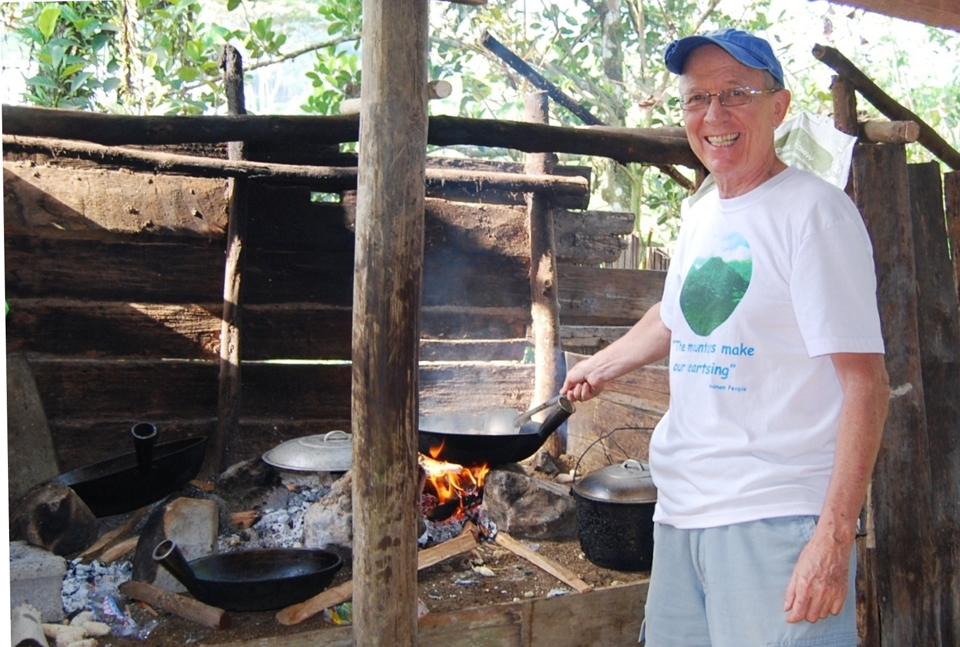
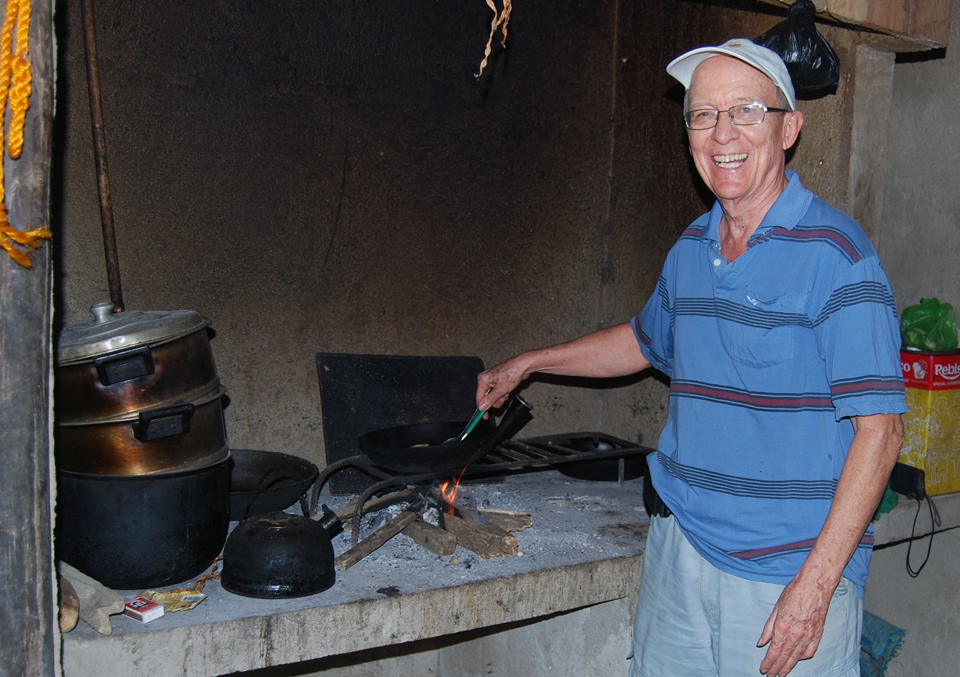
Fr Vincent Busch in outside kitchen; in enclosed kitchen
St Joseph cooking for Mary Christmas card
Having an enclosed kitchen area is a welcome improvement for our home but having food to cook is a necessity. Each year many Subanen families go hungry because they have exhausted their stored grain and root crops. This lean time of the year is called the ‘hunger season’ and it lasts for months. During these months many Subanens develop intestinal illnesses that sometimes require hospital care. Some Subanen families have had to sell their land and farm animals to pay for their medical expenses. Because I have a steady income I can buy rice for my family during the hunger season so we have been able to eat and to keep our land and animals.
As a part of Subanen Crafts I have been able to help my family and help our pre-schools educate our little ones. My craft work also helps me share our culture and celebrate our deep bond with God’s creation. Recently, I designed an adjustable bracelet containing beads that represent the Earth and the other planets. When I look at the tiny blue Earth-bead I think of the Earth as the sacred home of my family and of all people.
The author is a first cousin of Mercy B. Gawason who has had articles in MISYONonline.com here and here. The website of Subanen Crafts is here.
A Christmas Gift to Japan
A Christmas Gift to Japan
By Fr Philip Ilio Bonifacio
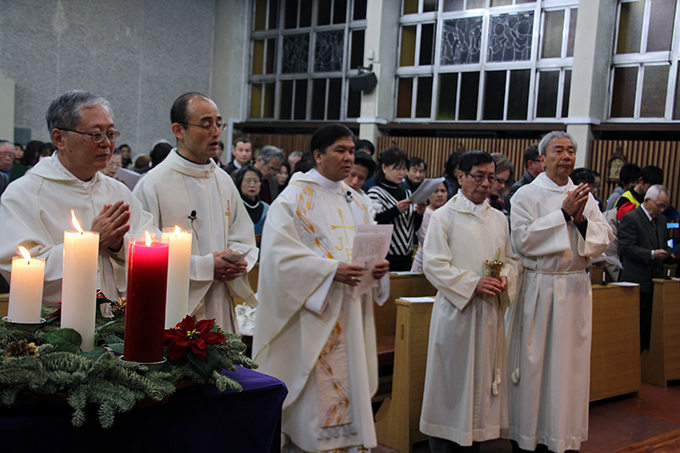
Christmas International Mass 2013, Matsudo Parish, Fr Philip in center
As December starts, people put their Christmas trees up, illumine their houses with Christmas lights and other decorations to create the ambiance of the Christmas season. In the Philippines, people gather in small groups for the evening caroling or daigon, going from house to house using improvised musical instruments. People are excited by the Misa de Gallo. We delight with fireworks greeting the night as we do the count down. It is the favorite time of the year for children as they await their gifts from ninongs and ninangs. Our Christmas comes alive with all the sharing and giving.
I used to think that the spirit of Christmas was the same in every part of the world.
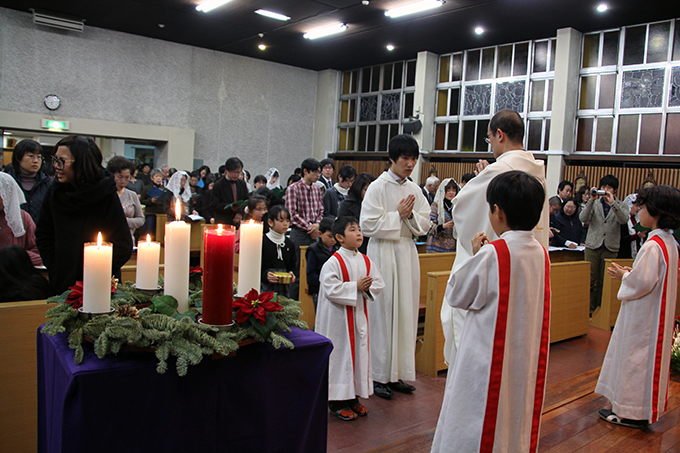
Christmas Children’s Mass 2013
For more than two decades, since I was assigned here after my ordination in 1995, I have spent most of my Christmases in Japan. Catholics – fewer than one in two hundred of the population of more than 127 million and about one fifth of all Christians - attend Christmas Eve Mass, sing some carols and share tea. After that, they go home. The atmosphere is nice with Christmas lights but firecrackers are not allowed, and there’s no house-to-house Daigon.

Tea Party after Christmas Eve Mass
My first Christmas here was a bit lonely. After the evening Mass, I was left alone in the parish since my companion parish priest had left for Ireland. It felt so sad since I had no family to spend the season with. So I called my family in the Philippines to greet them. Then I phoned the Filipino parishioners as they were either alone or with their spouses, also sad for being away from home. We met and agreed to go to a restaurant. Since then we’ve been doing this every year after the ‘Midnight Mass’. We gather as many Filipinos as would like to join us for our Japanese Noche Buena.
Sometimes we go to one house for coffee. It’s a joy also to share Filipino dishes cooked by Filipino parishioners. That’s how we celebrate Christmas. We become one family as we commemorate the birth of Jesus Christ.
In 2012 I became parish priest of St Michael the Archangel Parish, Matsudo, Archdiocese of Tokyo.
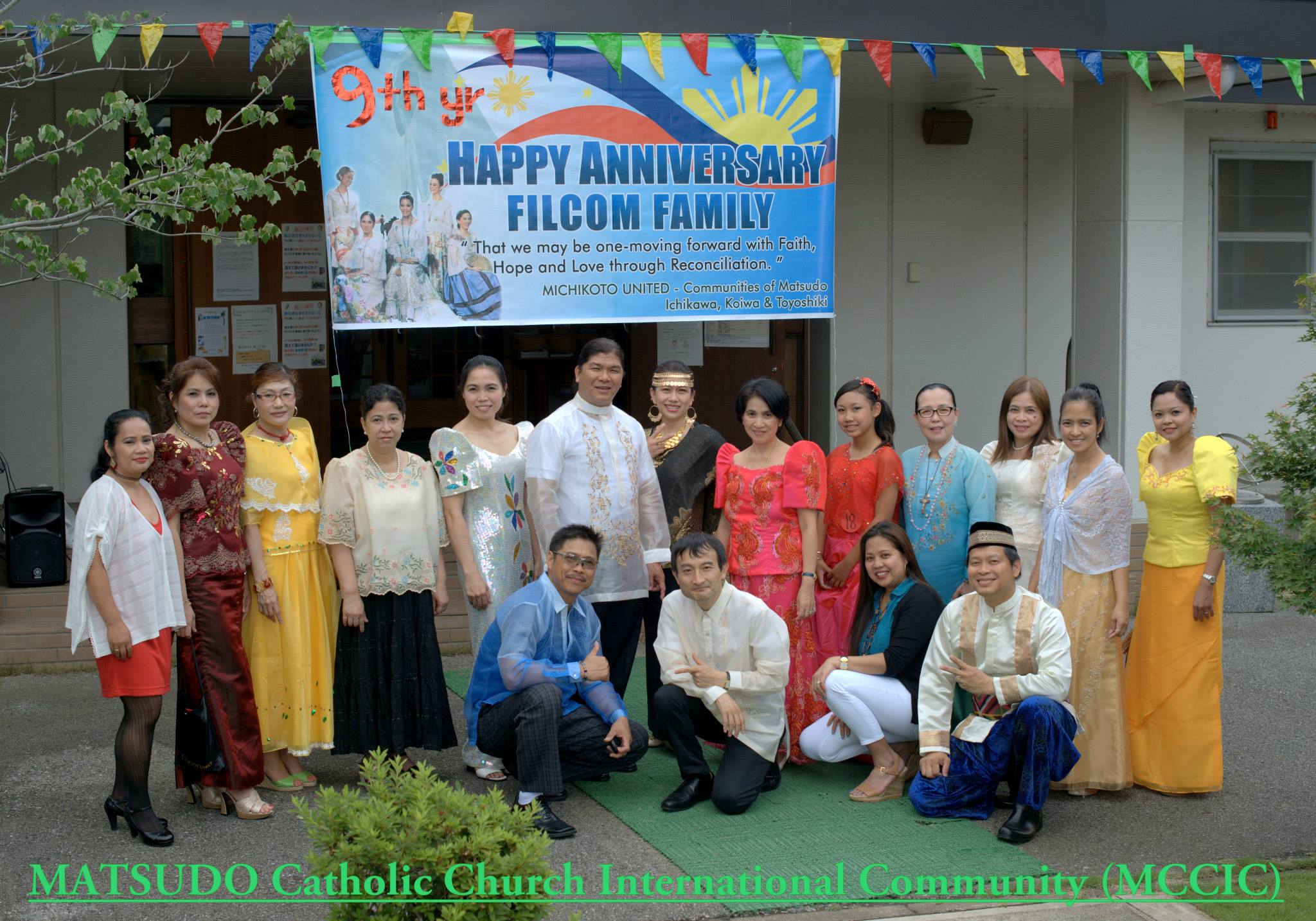
Filipino Community, Matsudo Parish
The Filipino Community is in charge of decorating the hall for the Christmas season. One day I asked myself, ‘How can I make Christmas memorable for the children here in Matsudo?’ I knew I had to initiate something. So two years ago, I incorporated caroling and gift-giving into the Midnight Mass. It was the first of a kind in Japan. Gift-giving in this context might be ordinary for us Filipinos but is something extraordinary for the Japanese.
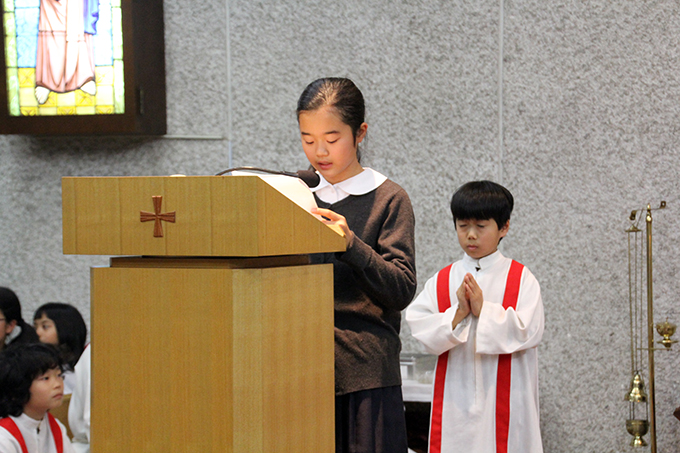
Christmas Children’s Mass 2013
I invited some parishioners to help prepare the gifts for the offertory at Tagalog and Japanese Masses. We came up with between 100 and 200 gifts for children. And at the Christmas Mass, before the final blessing, we invited all the children to come up to receive their gifts. Shy as they might seem, you could see big smiles on their faces.
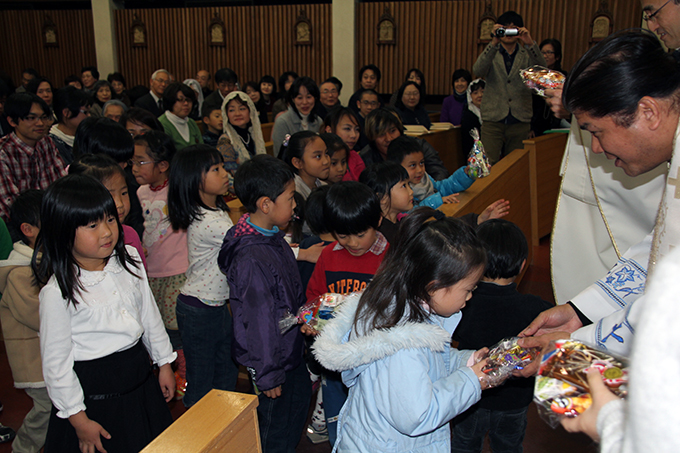
Children receiving their gifts 2015
We also have a kindergarten near the church where I have been teaching English since 2013. I was later invited to become its principal but declined as I had other obligations. My decision was affirmed by the bishop. Before, there had been no connection between the kindergarten and the church. I think it was the previous Japanese priest who drew the line to avoid conflict – let Christian service be for Christians, Japanese for the Japanese only. Christianity is seen as foreign by most Japanese and Filipinos are regarded as foreigners.
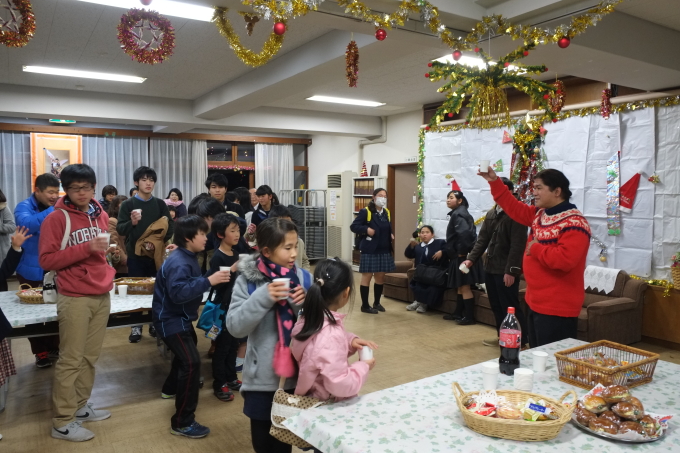
Tea Party with the children 2015
But if you say to Japanese people, ‘our parish is also Japanese’, they are surprised to know that there are Japanese parishioners actively participating in the Church. They often react with, ‘I thought it is only for foreigners’. Some Japanese are a bit shy about their identity, so it’s good to motivate them. We are not exclusive.
Carol singing before Christmas Eve Mass
Since the principal of the kindergarten is a Catholic, I talked to her and invited the Japanese children in Yōchien (kindergarten) to join the parish Mass on Christmas Eve or on Christmas Day so that we might also give them gifts. She responded positively.
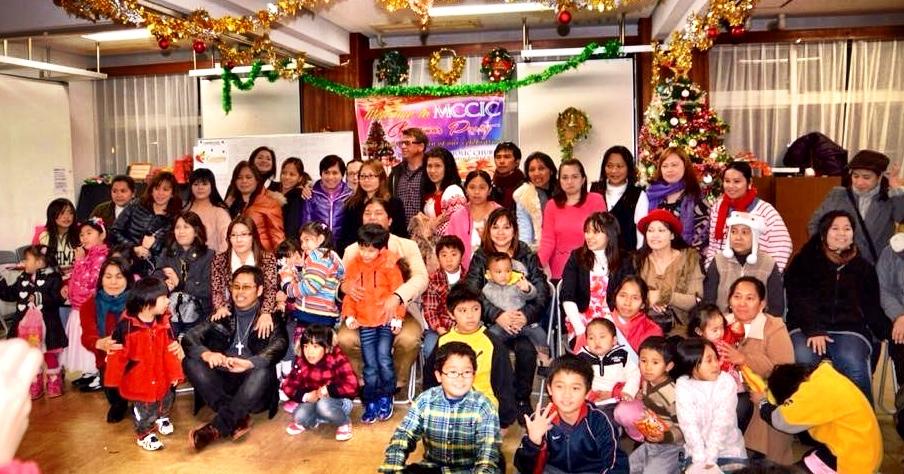
In the parish hall, Christmas 2013
The day came with Japanese children bringing their parents and grandparents. For the first time, they experienced the church community on Christmas Day and a parish giving gifts to children. Since we are in the context of the Church, we say that Father (Priest) was distributing the gifts, not Santa Claus. The kids wore big smiles as they received their gifts. They were delighted and we were more than happy to see them rejoice on Christmas Day, a memorable occasion for them and one they now look forward to each year.
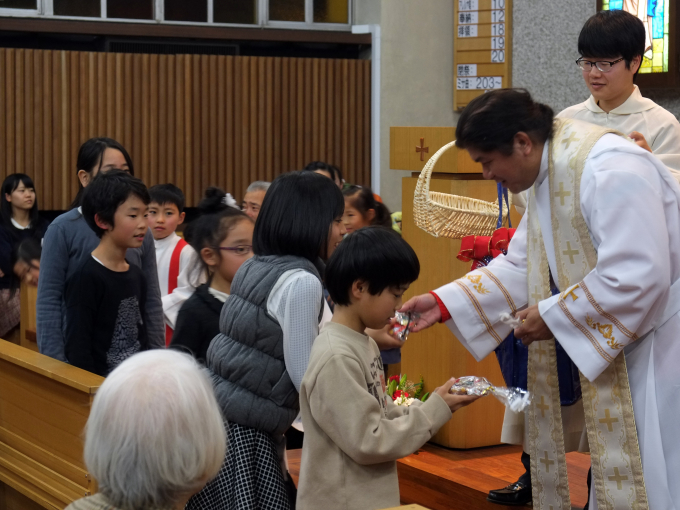
Children receiving their gifts 2015
Some Japanese members of the Parish Pastoral Council initially questioned this, thinking that it would entail expenses. But ‘This is Christmas and we don't usually do this’ prevailed and we all ended up happy. The beauty is that with Japanese children bringing their grandparents, the elders now want to come back. And the Catholic parents are also encouraging grandparents to tag along with their grandchildren. So we came upwith an additional preparation for Christmas, a Communal Rite of Reconciliation for the Japanese on the first or second Saturday of December.
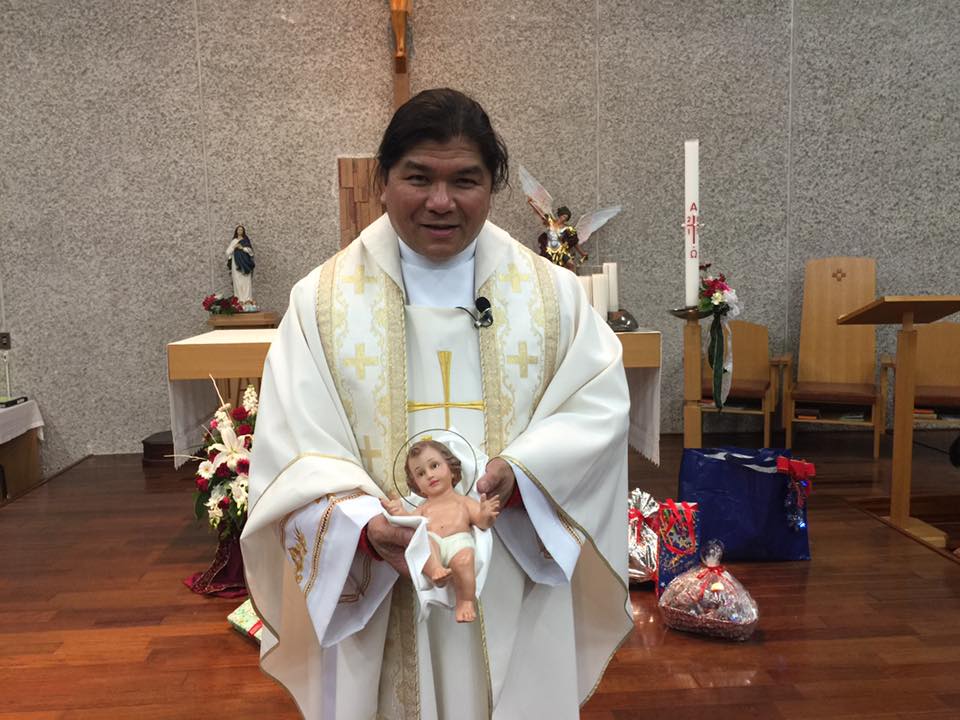
Fr Philip with Baby Jesus, Christmas 2015
I am happy with this kind of Christmas spent with the children and their families, happy because parents are very supportive in bringing their children – and there are many of them - to church. It's nice to see them re-introduced to the Church. Others who learned about this activity start to inquire about the different services offered by the parish.
Mother Church is inviting us ‘to go out and find your sheep’. And this is how we in Matsudo Parish have responded. This is our Christmas gift to Japan.
The Little Angels of Nagasaki with Andre Rieu
‘Silent Night’ in Japanese
